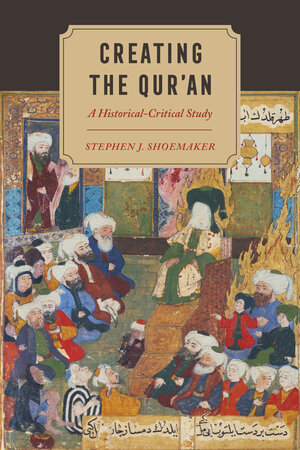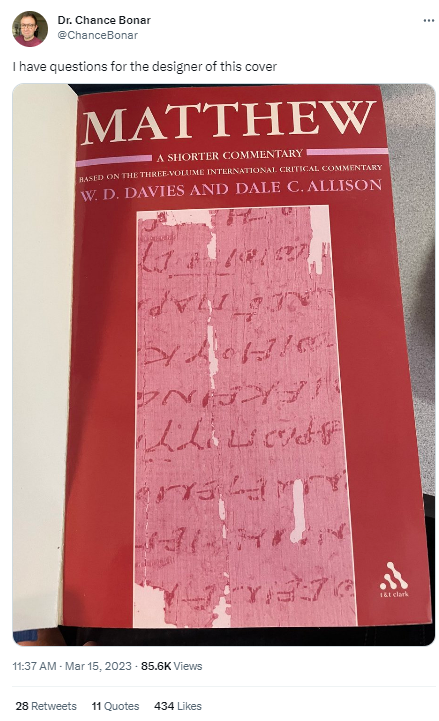As I promised, I’m back… in black. Freshly raised from the dirt of Durham, NC.
Why have I returned to the faithful? First, I want to spread the good news of the very best in biblical studies blogging, tweeting, TikToking, Insta’ing and YouTubing during March 2023—in short, to showcase biblical studies resources on social media. But second, and more importantly, I wish to mark the 50th Anniversary of the first album from the greatest band in pop music, ABBA. Ring Ring was released 50 years ago, on March 26, 1973. What a moment in time! I suspect that Paul of Tarsus had the Fantastika Foursome in mind when he wrote:
“God has sent the Spirit of his Son into our hearts, crying, ‘ABBA!’ ”
(Galatians 4.6)
Here we go again!
Archaeology & Geography
Within two days in early March 2023, the Israel Antiquities Authority went from announcing the amazing discovery of a potsherd inscribed with the name of Darius I to announcing that it was a fake. The IAA’s original announcement was met by suspicion as well as outright scepticism on social media (Jim Davila, PaleoJudaica; Daniel McClellan, @maklelan; Robert Cargill, XKV8R; Jim West, Zwinglius Redivivus).
As it turned out, the “Darius inscription” was created only last year at Tel Lachish, to demonstrate Aramaic inscription techniques to students (Christopher Rollston, Bible History Daily, BAR; Jim Davila, PaleoJudaica: here and here; Daniel McClellan, @maklelan; Aren Maeir, Tell es-Safi/Gath). The IAA had misdated the Darius inscription by two and a half millennia. Robert Cargill’s reaction was on the money: “I’m glad to know that my BS-detector still works after all these years” (XKV8R).
In this farce, the Israel Antiquities Authority once again reveals its role as Apartheid Israel’s state apparatus. Apartheid Israel employs the IAA to perpetuate the Israeli state’s jingoistic nationalist narrative and thereby help sustain its brutal suppression of Palestinians. Accordingly, we can expect this type of BS to keep flowing from the IAA.
Did you know how important historical geography was for understanding biblical texts? Amy Balogh, Chris McKinny and Kyle Keimer tell us how important, considering the cases of Shechem, Nahal Besor, and the Jordan River (on their OnScript podcast).
Biblical Reception
Did the Qur’ān take some of its materials from the Christian New Testament and from later Christian texts? Undoubtedly, yes. Did the composers of the Qur’ān carry this out during the life of Muhammad or much later? That’s more complicated, but Philip Jenkins (Anxious Bench) provides a detailed overview and review of Stephen J. Shoemaker’s arguments on the Christian sources of the Qur’an, in Creating the Qur’an: A Historical-Critical Study (University of California Press, 2022). Philip provides some good examples of how the Qur’ān was in part composed, not by revelation to Muhammad but, by employing Christian texts as source material. The examples are compelling, including Shoemaker’s favorite example of the Isa/Jesus birth narrative in Surah 19. But along with scholars such as Gabriel Said Reynolds, I still think there is a case for Christian presence in the Hejaz during Muhammed’s lifetime.
CenSAMM noted a new article by Alastair Lockhart, up on the Critical Dictionary of Apocalyptic and Millenarian Movements (CDAMM) website. Alastair analyses ‘The Second Coming,’ perhaps William Butler Yeats’ most famous poem. Lines of the poem, as Alastair notes, have become widely known, even beyond poetry-and-wine evenings at Anglican churches: “the centre cannot hold,” “the best lack all conviction,” and “what rough beast… slouches towards Bethlehem to be born?” Memorable lines that rival ABBA’s most poignant moments, such as (to choose from so many possibilities): “sometimes when I’m mad there’s a part of me that seems to be a little sad” or “I’m like a dream within a dream that’s been decoded,” or perhaps “dum dum diddle, to be your fiddle.” Sublime!
On the Art Is Cheaper Than Therapy podcast, Alexandra Kytka-Sharpe chats to Michelle Fletcher about her online exhibition of Daniel 5, “The Writing on the Wall,” over at The Visual Commentary on Scripture. And they tackle some other subjects such as Terminator and Dr Strangelove. Michelle tweets with the twitter handle @ntright, which seems to be some sort of parody.
Confessed “lifelong Bible geek,” Peter T Chattaway (Thoughts and Spoilers) gushes about Darren Aronofsky’s Noah, and begins a line-by-line commentary on the entire film.
Early Judaism
Historical criticism

As ABBA taught us, “The history book on the shelf is always repeating itself.” In “The Heavenly Temple, Seeing God and New Forms of Religion after 586 BCE,” Seth L. Sanders examines how visionary descriptions of Yahweh’s divine abode after the destruction of his Jerusalem temple have re-used earlier ancient near eastern and biblical descriptions of divine houses. Seth makes some interesting points about the survival of the ancient “brick” motif in later apocalyptic visions of God’s house. But is he right to talk of a “heavenly temple” in Persian-period and Hellenistic visions of God’s abode? (Earthly) temples were intended to represent God’s imaginary heavenly house, and that divine house was God’s palace. The reverse is not true: the imagined heavenly palace is not primarily a reflection of the earthly temple and nor is it primarily imagined to function as a temple. As J. Edward Wright has demonstrated (Early History of Heaven, 2000), throughout the ancient near east and in Jewish texts, God’s heavenly dwelling is primarily conceived as a palace, a great house. So Isaiah 6:1 presents a gigantic god, but not one filling a temple as Seth translates it; instead, the vision presents “the Lord seated on a high and lofty throne; and the hems of his garment filled the Palace [היכל].” It is a heavenly court in view, centred on the enthroned divine king and his courtiers. And that is likewise the setting for Enoch’s apocalyptic visions in the Hellenistic era (see Philip Esler, God’s Court, 2017). While aspects of the (earthly) temple might in turn influence constructions of heaven, that effect is a secondary one.
Ancient near eastern gods liked to be well fed in their earthly palaces, and there are many surviving aNE inscriptions in which kings boast about how much they fed their gods. Yahweh was no exception. He loved his loaves of (unleavened) bread, as Jennie Ebeling (The Torah.com) describes in her analysis of the Lechem Hapanim, the Bread in the Presence.
What’s the current state of Pentateuchal scholarship, you ask? Oliver Achilles (Auslegungsache) notes an excellent and up-to-date article on the topic by Konrad Schmid (“Die Torah als multiautorielle Diskussionsliteratur“/”The Torah as Multiauthor-Discussion Literature”). The highlight of the piece for me is when Schmid discusses his general approach to reading Pentateuchal literature: “Die Hauptleitlinie der Kompilatoren der Torah war es nicht, eine kohärente, stromlinienförmige Erzählung zu schaffen, sondern so viel wie möglich aus den bestehenden Traditionen zu integrieren. Die besondere Art und Weise, in der die Torah verfasst wurde, verlangt von den Lesenden eine Beteiligung an der Hermeneutik, die in den Text eingebettet ist. Die Torah ist ein zusammengesetzter Text. Aber die Aufgabe der Wissenschaft geht über die bloße Rekonstruktion der verschiedenen Schichten in der literarischen Entwicklung der Torah hinaus. Es bedarf eines hermeneutischen Ansatzes, um eine Lesart des Pentateuch zu entwickeln, welche die Mehrdeutigkeiten berücksichtigt, respektiert und aufrechterhält, die seine Autoren und Redakteure hervorgebracht haben und die für den dynamischen Charakter sowohl des Textes selbst als auch seiner Rezeptionsgeschichte verantwortlich sind. Die Torah muss als eine organische Texteinheit betrachtet werden – unter umfassender Würdigung ihrer komplexen Entstehungsgeschichte. Diese Art der Lektüre knüpft in gewisser Weise an Nietzsches Kritik an der Zerlegung Homers an. Der aktuelle Forschungsstand weist darauf hin, dass die Gruppe der Leser der Torah mit der Gemeinschaft der Autoren identisch ist, das heißt, die Leser sind die Verfasser, Sammler und Herausgeber. In der Antike Texte zu verfassen bedeutete sowohl, die Tradition aufzuzeichnen, als auch, die bestehende Tradition zu rezipieren und sich mit ihr auseinanderzusetzen. Möglicherweise wussten die antiken Schreiber und Leser, wie diese Texte entstanden sind und waren bestrebt, Unterschiede zu bewahren – nicht um eine nahtlose, lineare Gesamterzählung zu produzieren, sondern um den Lesern zu vermitteln, wie sie ihren jeweils eigenen Sinn auf der Grundlage einer sehr komplexen, oft uneinheitlichen, manchmal sogar widersprüchlichen Textgrundlage entwickeln können. Man könnte diese Evokation von Bedeutung in einer neuen Dimension als ‚stereometrisches Lesen‘ bezeichnen. Die wichtigsten Interpretationen der Torah werden im Text nicht explizit angegeben. Sie tauchen vielmehr im Prozess der Rezeption durch das Publikum auf.”
Precisely. (And sure, you might object that folks like Nahum Sarna, Jack Miles, Michael Fishbane, Yair Zakovitch, James Kugel, Bernard Levinson, Isaac Kalimi, Benjamin Sommer, Hindy Najman, Jeffrey Stackert, Adriane Leveen, and Molly Zahn were here decades ago, but isn’t it good to see the Germanic world catching up.)
Israel Finkelstein chats about the Philistines with Matthew J. Adams (Kedem). The YouTube video is Part 7 of an ongoing series with Finkelstein. Here’s a link to the complete playlist, too. Not to be outdone, Aren Maeir also talks about the Philistines with Tristan Hughes on The Ancients podcast.
Who is the Angel of Yahweh, aka “the Angel of the Lord”? Daniel O. McClellan explains how actions of Yahweh get transferred to the Angel of Yahweh in a number of biblical texts, the versions and targums (at theTorah.com).
Reed Carlson, over at the ASOR blog, asks “Are Possession and Other Spirit Phenomena Depicted in the Hebrew Bible?” Seems obvious. I ask: “was anybody straight when they wrote the stuff that ended up in the Hebrew Bible?” Now there’s a question worth thinking about.
Ketuvim
Each of the biblical books of Esther and Daniel rely on what is essentially the same plot device: a law that is binding even on the king and that thereby causes a considerable problem. Spencer McDaniel (Tales of Time Forgotten) examines how this pans out in each fictional biblical book. The law is highly improbable and completely unattested. Or as Spencer puts it, it’s “the Dumbest Fictional Law in Ancient Literature.”
Erica Mongé-Greer (Scholarly Wanderlust) reflects on a difficult text, but clearly also one of her favorite texts, Psalm 82. She writes about the history of its interpretation, divine councils, the importance of its poetic form, and makes a tantalizing mention of the Ugaritic Tale of Aqhat. For those interested in further reading, she has also just published a monograph on these issues, Divine Council, Ethics, and Resistance in Psalm 82 (March 2023).
Dead Sea Scrolls
Professor Emerita Sidnie White Crawford (Early Jew Review) reflects on her career, beginning in the 1980s, involving deciphering, editing, interpreting, and writing about the Dead Sea Scrolls. She explains how the increase in manuscript evidence from the Qumran caves gradually led to a paradigm shift in the way the scrolls were interpreted.
Andrew Ferguson (Evangelical Textual Criticism) examines the changing categorizations Emanuel Tov has given the biblical Dead Sea Scrolls over the four editions of his book Textual Criticism of the Hebrew Bible. The changes, all tabulated by Andrew, reflect the increased data available over the relevant period and Tov’s changing evaluations of that data.
Thinking of redecorating? Looking for a suitable color palette? Are you a lifelong biblical studies geek? Hilda Deborah presents: “the colors of the Dead Sea scroll fragments‘:
Early Christianity
The Gospels and Jesus
It has been dubbed the best book on the historical Jesus since David Strauss’ Das Leben Jesu. It is Jesus: A Life in Class Conflict by James G. Crossley and Robert J. Myles, released March 2023. I can only adequately convey what a profound impact this book has had on me by expressing myself in the Swedish tongue: “hjärtat gjorde en volt, ding-dong bing-bong!”
James and Robert have made available a series of free videos on YouTube that include enticing extracts from their must-read book, read aloud (I assume from the dulcet tones) by Robert. In addition, the co-authors were guests on the MythVision podcast, talking about the Historical Materialist Jesus with presenter Derek Lambert for a marathon 2-hour-plus session. One has the feeling that, after this book, there will be no going back to the hagiographic “wonders of the Great Man Jesus” tripe that was typical in (pre-Jesus: A Life in Class Conflict) biographies of Jesus.
Dan McClellan (@maklelan on the Insta) dispels the widely-held but false idea that New Testament writings consider Jesus to be God. No they don’t. As Dan ably explains, you don’t get this conclusion from the fact that Jesus possesses divine titles. And you don’t get this conclusion if Jesus does what only God is supposed to be able to do. And you don’t get this conclusion if Jesus receives forms of worship. The type of thinking invariably assumes an anachronistic conception of monotheism that neglects the divine intermediary category that Jesus most closely matched. So it is wrong, wrong, and wrongity-wrong.
In March 2023, Mark Edward (A Bible Darkly) provided us with a detailed examination of how the Gospel of Mark employed earlier sources, such as the Last Supper tradition that Mark stole from Paul’s first letter to the Corinthians. Mark (Edward, not the Evangelist) is right, but Hans Lietzmann (Messe und Herrenmahl/Mass and Lord’s Supper) was all over this back in 1926. Lietzmann essentially observed that the whole Last Supper scene comes from Paul’s fertile imagination, having believed that he had been mystically told about it by the ascended Jesus himself. Mark (Edward, not the Evangelist) correctly concludes that dependencies like this in Mark (the Evangelist, not Edward) “call into question the historical plausibility of large parts of his narrative.”
It was published a few years ago now, but Chance Bonar has questions for the designer of this book cover:
Jacob Berman (History Valley) pumps Chris Keith with a few dozen questions on the historicity of the Gospels and Jesus. Jacob asks Chris about the different estimations of Jesus’ literacy among his original audience, whether Jesus was especially Hellenistic, the historicity of Jesus’ disputes with Pharisees and Sadducees, Chris’s favourite topic: the story of the women caught in adultery (in John 7:53–8:11), Ed Sanders on the historicity of the controversy stories, whether Paul’s view of the law differed from Jesus, and much more. Chris sure is a teaser: he turns ’em on, leaves ’em burning and then he’s gone.
Amy-Jill Levine informs people how they should understand the Pharisees, despite the weight of centuries of New Testament–inspired prejudices. In particular, she discusses Matthew 20.29–23.39 on The Two Testaments podcast, hosted by Rony Kozman and Will Kynes. There are many gems, and among them is Amy-Jill Levine’s discussion of Jesus’ warning during his Sermon on the Mount that “unless your righteousness exceeds that of the scribes and Pharisees, you will never enter the kingdom of heaven.” You would misunderstand Jesus if you thought the Pharisees were being made out as the bad guys here. Levine puts it this way: “he’s not saying you have to be better than a Nazi child molester right? He’s setting the bar pretty high. If the Pharisees are screwed, wow, we really better get our act together.”
Alan Garrow continues to vigorously defend his hypothesis of the posteriority of Matthew (MPH) . He has provided a “studio version” of his presentation at the SBL Global Virtual Meeting (March 30, 2023) to the Synoptic Problem Group on Facebook. Alan’s ongoing advocacy for MPH shows no sign of fatigue… unlike Luke’s use of Matthew in the Parable of the Talents (Matt 25.14–30||Luke 19.11–27).
Phil Long (Reading Acts) provides a series of posts on Matthew’s passion narrative: Jesus’ arrest, his requests to let ‘the cup’ pass from him, Judas’ kiss, the sword attack by one of Jesus’ disciples, Jesus’ arrest as prophecy fulfillment, Jesus before the Sanhedrin, the High Priest’s question about Jesus being the Messiah, whether Jesus claimed he would destroy the Temple, the Blasphemy charge, and Peter’s denial of Jesus. The posts include this interesting suggestion: “Peter may have intended to cut the ear off the servant of the priest. By mutilating his ear, he would no longer be allowed to enter the temple courts to serve as a priest. Leviticus 21:16–24 lists a series of blemishes that disqualify a priest from service in the temple, including ‘one who has a mutilated face.’ Josephus says Antigonus cut off Hyrcanus’s ears to disqualify him from the high priesthood (Antiq. 14.13.10, 366).” If true, that would be some quick-thinking and very practical halakah from Peter. It has some plausibility as a literary creation, though.
The Enoch Seminar made available the proceedings of its Zoom seminar on “John within Judaism” (March 14, 2023). The discussion involved a wide range of scholars gathered together by Enoch Seminar founder Gabriele Boccaccini. This seminar includes Adele Reinhartz’s opening address, in which she makes the following excellent critical point: “Situating John within Judaism… provides a comfortable answer to the uncomfortable question of anti-Judaism…. Many discussions of anti-Judaism and of John within Judaism involve a certain degree of Christian apologetics…. One apologetic claim is to use ‘within Judaism’ to characterize the gospel’s hostility towards the Iudaioi as reflecting an inner-Jewish skirmish that cannot involve anti-Judaism because both sides are Jewish. Hstory tells us however that it is most definitely possible for someone who is ethnically Jewish, which may or may not be true of John, to be extremely anti-Jewish or in the modern period anti-semitic.”
Also, J.R. Daniel Kirk talks about resurrection and marriage in heaven, according to Mark 12.18–27, in conversation with Stefan Smart on the Question Mark podcast.
Paul
Kicking off Season 2 of ”Disproving the Prooftext,” Pete Enns, Jared Byas, Jennifer Garcia Bashaw and Anna Sieges-Beal look at another so-called “clobber passage” from Paul of Tarsus’s sexiest chapter, 1 Corinthians 7: “For the wife does not have authority over her own body, but the husband does; likewise the husband does not have authority over his own body, but the wife does” (v.4). Interesting discussion ensues. But perhaps ABBA addressed this issue best, in one of their more underrated songs, “Bang-a-Boomerang,” singing these breathtaking lyrics: “Making somebody happy is a question of give and take… Every feeling you’re showing is a boomerang you’re throwing.”
Simply beautiful. <sigh!>
Also, in a series of talks, Ben (The Amateur Exegete) tackles the implications of realising that Paul was a Jew, discussing also some of the recent scholarship on this issue: Part 1; Part 2; Part 3.
Revelation(s)
On YouTube, Lynn Huber, Stephen Young and the Queen of the Heathens discuss Revelation through queer, feminist, and postcolonial lenses. Lynn makes the interesting observation that the term apokalypsis (“unveiling”), which gives its name to The Apocalypse of John, recalls the moment in a Greek wedding when the virgin bride’s veil is lifted up, and that this is probably tied to the “Bride of Revelation,” who is revealed at the climax of the book.
In the Misquoting Jesus podcast, Bart Ehrman and host Megan Lewis also get into some detailed discussions of the book of Revelation. In “Why is the Book of Revelation in the Bible?” they wonder, like many others before them, why such a fucked-up piece of writing ended up in the Christian canon. They also address the question, “Is the God of Revelation the Same as the God of Jesus?” by examining how nasty God and Jesus act in the book. They are interesting discussions, but they raise the old anti-semitic trope of ‘bad Old Testament God’ and ‘good New Testament God’, which Bart Ehrman rightly dismisses as too simplistic, but which might better have been directly addressed, as for example by Amy-Jill Levine on Bart’s own blog. Is it not rather the case that the New Testament God is infinitely more punitive towards those who reject the exclusivist Jesus sect, compared with anything in the Hebrew Bible? And is this exclusivist understanding not also present in Jesus’ ‘gnashing of teeth’ and similar vindictive sayings in the Synoptic Gospels as well in his directions at the sending of the twelve? Does this focus on Revelation’s exceptionality make it out to be the ‘too-Jewish’ supplement to the New Testament that, in the Derridean logic of the supplement, makes explicit the excessive and infinite terror of the God of the Synoptic Gospels?
Language and Textual Criticism
Mitchell First (Jewish Link) explains how Hebrew has a “reduced alphabet,” by comparison with other Semitic languages (h/t: Jim Davila, PaleoJudaica).
Grégory Osmont tweeted to announce that he had added the Phoenician lexicon (900 words) to LinA (“Database for the study of the ancient scripts”).
Advances in Biblical Studies
In a sign of our times, a populist Canadian psychologist by the name of Jordan Peterson has made a career out of vapid pronouncements on subjects he clearly knows nothing about. Peterson delivers his empty platitudes with the level of self-assurance mustered only by the wilfully ignorant. Infamously, his debate with Slavoj Žižek on the topic of Marxism revealed that Peterson had only read a short pamphlet co-authored by Karl Marx and had ignored (or more probably was ignorant of) all of Marx’s main works, which resulted in Peterson being thoroughly schooled by Žižek. Peterson was so out of his depth that he lacked even the ability to realise his own ineptitude.
In March 2023, Peterson did it again, tweeting angrily and unthinkingly in response to biblical scholar Dr Daniel McClellan (@maklelan). Daniel had earlier rightly critiqued Peterson’s false reduction of Christian salvation to matters of individualistic soteriology, to the exclusion of ‘social justice’ concerns. Daniel’s reply seems to have annoyed the thin-skinned Jordan Peterson, who tweeted more fatuous pseudo-intellectual babble in reply. Daniel followed up with a post helpfully distinguishing ancient and modern understandings of ‘social justice.’ Still, Jordan Peterson will learn nothing from it.
On the left is how Jim Davila looked before he started blogging in March 2003. On the right is how he looks now, after making 21,669 posts on Paleojudaica. Yes, March 2023 marked the 20th Anniversary of what is one of the finest, and one of the oldest, biblical studies blogs. Paleojudaica continues to be a veritable storehouse of news, publications, critical analysis, debunking, as well as humor in biblical studies blogging.
You can take the future even if you fail
If you’re interested in signing up to host a future Biblical Studies Carnival, contact Phil Long (email). The next Carnival, for April 2023, will be hosted by Phil Long himself (Reading Acts).
How I treasure every minute, being part of, being in it.
Until He returns,
Higher up and further in,
Bishop N.T. Wrong
Universalist Church of Durham, NC
.























